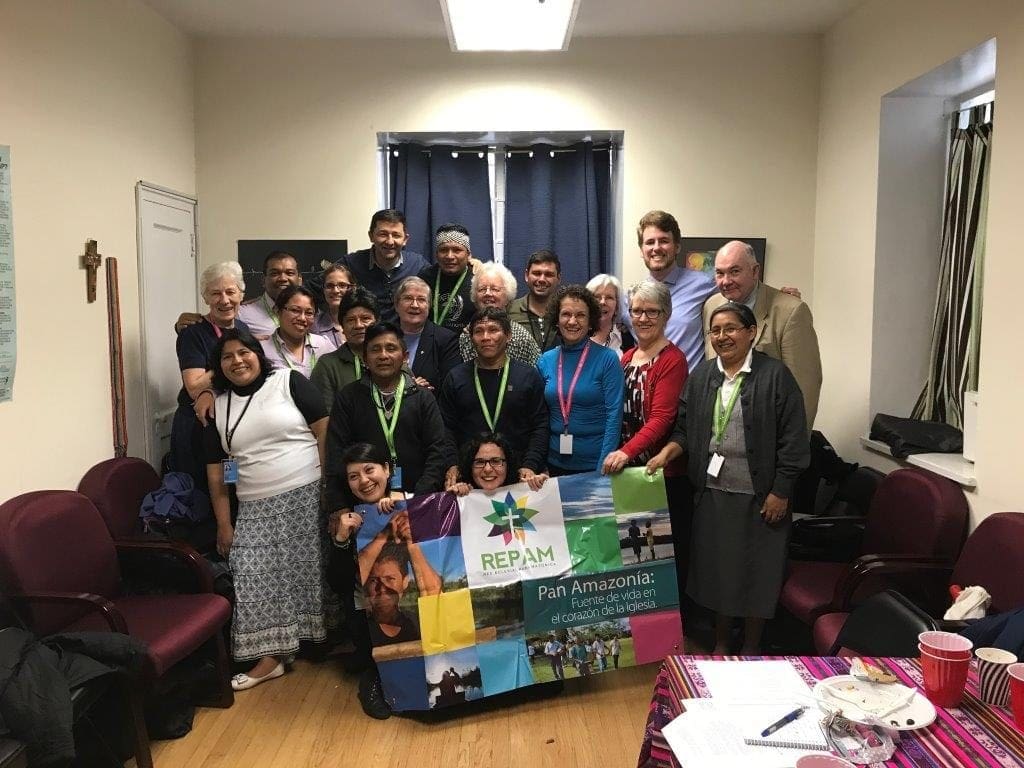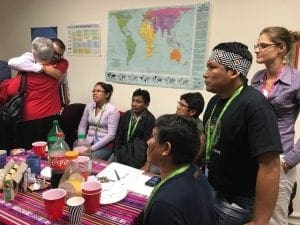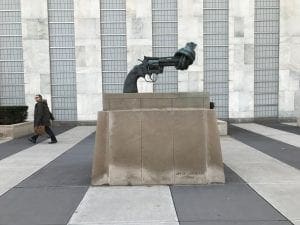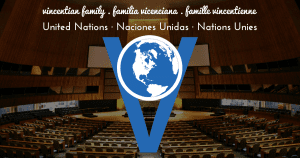
As a young child my Father took my sisters and I on a boat trip around Manhattan Island.
I remember being in awe of the sights from that vantage point. Although I was growing up on Long Island, I knew the city. It was where Dad worked, and the grandparents and cousins lived.
As we came up the East River I was awestruck by the sight of the United Nations. I clearly remember thinking this is where very important people work. It was where so many important topics were being discussed and decided upon. People from all over the world gathered, trying to understand each other’s views. Coming from a small homogenous town, the UN was a place a little girl could see as quite exciting and exotic!
Fast forward some 60 years and here I am representing the Society of St. Vincent de Paul at the UN! That little girl on the boat is with me every time I enter the gates and make my way across the UN plaza. Coming to the UN as a NGO representative, I recognize the importance of what I do. I also realize I’m not an important person. I represent very important people. The people who can’t come to the UN and speak for themselves. They’re scattered throughout the world, living in poverty, being suppressed by unfair government policies, racism and ignorance.
A couple of weeks ago I attended a panel on climate induced displacement. There were indigenous people from several parts of the world who spoke eloquently on the loss of land and migration from their home lands.
I heard from Sunema Pie Simati, Secretary, Permanent Mission of Tuvalo, a small island nation in the South Pacific. Secretary Simati told us they have lost four islands since 2000, due to the sea level rising. Two of these islands were lost in March 2015 due to a storm.
The rising sea level is more than simply an issue of lost land caused by flooding. It also affects food and water security. This nation depends on crops and marine life for survival. Flooding from the sea destroys the fresh water supply. And they can’t simply move to higher ground here, there is no higher ground. Displacement must be external.
This an entire country now effected by climate change. 100% of the Tuvalo people are facing loss of their sacred homeland.
A second speaker was Prairie Rose Seminole. Prairie Rose represents several Native American Tribes, including four Alaskan Tribes.
She told us outsiders came to their lands to fish, and make changes to the infrastructure. This has increased the cost of living, making it more  difficult for the tribes to survive in the old customary way. Many are faced with the prospect of moving away. They fear a loss of language and culture. The elders and the younger generation are prone to stay on their lands, while the middle-aged want to move.
difficult for the tribes to survive in the old customary way. Many are faced with the prospect of moving away. They fear a loss of language and culture. The elders and the younger generation are prone to stay on their lands, while the middle-aged want to move.
Prairie Rose wept when she told us her people are tied to the land; they live off the land, and always have. When they can no longer live as they have in the past food actually becomes a luxury.
The Alaskan tribes are facing severe loss of the icecap, which means helicopters can no longer land on the ice in case of medical or other emergency. Expectant mothers now leave their homes, and move inland two months prior to their delivery date for the sake of safety, separating them from their families at this critical time for family support and unity.
We also heard from Adelson Kora Kanamary, of the Kanamary People, Brazil.
He wanted us to know how climate change has affected not only the people of the forest, but ALL of us. The entire world is connected. He reminded us we were discussing the world’s climate, which has no boundaries, or frontiers.
From his front-line perspective, he told us he believes the large corporations do not see climate change, they cannot see what is happening to the poor. The people of the Amazon know how drastically changed our world is. They have a much more direct handle on climate change. They feel it, they touch it, and they can smell it.
The sun in the Amazon is hotter than it was ten years ago, and there’s less rain. The fish are dying, and workers in the fields can no longer work long hours, due to the extreme heat from the sun. Then during the rainy season, the rains come faster, and the rivers rise higher. People have to move away from the river banks as they overflow.
He referred to this as “The revolt of the Earth”
It was also stated by Teresa Blumenstein, UNANIMA International, “One of every five breaths we take was cleaned by the Amazon forest.” We are undoubtedly connected. We may be half a world away, but we are one world.
So, how does all this connect to my role as a representative of The Society of St. Vincent de Paul? I see it clearly. The people living in poverty throughout the world and people NOT living in poverty throughout the world are one family. We are all in this together. Those living in poverty need a voice at the table. Those living in remote places, the front lines of global climate change, need a voice at the table. That’s where I believe we/I come in. I’m sitting at the table, along with other members of the Vincentian Family; we’re speaking on behalf of those who can’t be here.
 Now, back to that little girl on the boat with her sisters and dad. She still believes the United Nations is a place where very important people make very important decisions. The difference is, now she realizes the people with the security passes aren’t the important people. It’s the people who aren’t at the table who are the VIPs. The people at the UN are simply the voice of the poor.
Now, back to that little girl on the boat with her sisters and dad. She still believes the United Nations is a place where very important people make very important decisions. The difference is, now she realizes the people with the security passes aren’t the important people. It’s the people who aren’t at the table who are the VIPs. The people at the UN are simply the voice of the poor.
I love to look at the river as I walk across the plaza, and sometimes I see one of the tour boats heading up the river. I always pray there’s little girl or boy on the boat, looking at the UN in awe, as I did all those years ago. We’ll certainly need their voice at the table in a few years.
Pattie Hughes, SVdP






0 Comments